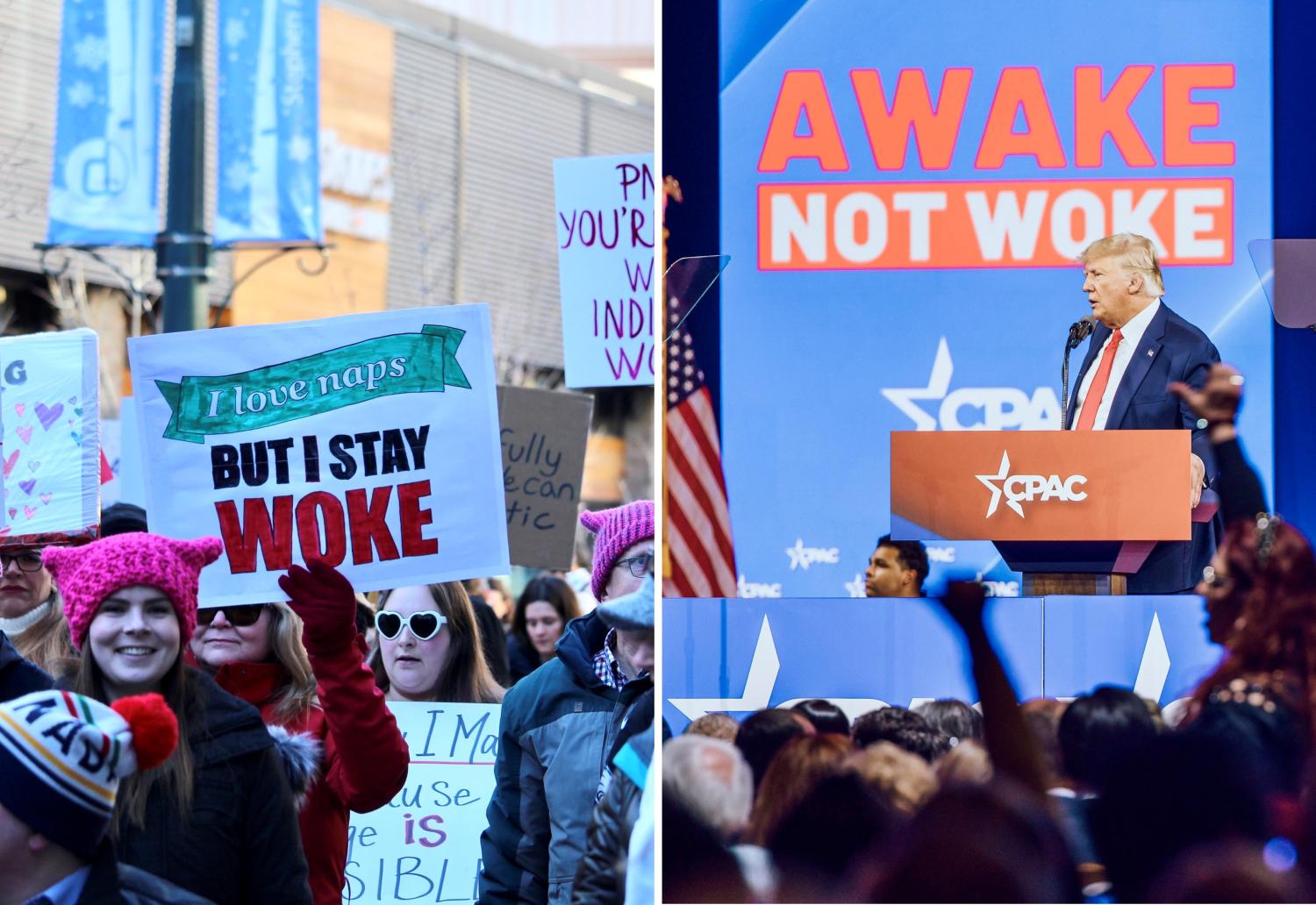What is ‘woke’? Who knows?
CU Boulder PhD candidate Benjamin VanDreew’s search for an answer to that question finds that Barbie is, book banning isn’t, and that female Democrats are more likely than male Democrats to be seen as ‘woke’
Is Chick-fil-A “woke”?
Seeing that question posted on Twitter (now X.com) back in 2023 made Benjamin VanDreew ponder: Who decides what qualifies as “woke”?
“I was on Twitter, and for whatever reason, trending that day was the question: Had Chick-fil-A gone woke?” says VanDreew, then an undergraduate at Utah Valley University and now a University of Colorado Boulder PhD candidate in the Department of Political Science studying American politics. “Seeing that post made me question: Is there a cohesive definition for woke? Or is it just kind of an anything-and-everything term?

CU Boulder PhD candidate Benjamin VanDreew was inspired to research wokeness after seeing a post on X and wondering, "Is there a cohesive definition for woke? Or is it just kind of an anything-and-everything term?"
“I really wanted to put the term to the test, because I think having specific definitions—especially in politics, when people are throwing around buzzwords—is incredibly important,” he adds.
“The term woke seems like it’s taken on a life of its own, so I don’t think anybody has felt the need to elaborate on it or explain it themselves. And if everything can just be tossed onto the pile of what the word means (definitionally), to me it makes the word have less meaning.”
In the absence of any widely recognized definition for woke, VanDreew says he was inspired to investigate how average Americans determine what constitutes “woke.” To do so, he and his coauthors commissioned a polling firm to query a demographic sampling of people nationwide about their own definitions of woke by asking them to choose between a series of two lists, with each list containing one political party, one sexual orientation, one gender group, one religious group, one political figure, one historical event, one profession, one higher education institution, one political movement and one political policy.
Those responses were then coded by whether the respondents self-identified as Republican, Democrat or independent and conservative, moderate or progressive.
The authors detailed their findings in the article “What’s woke? Ordinary Americans’ understandings of wokeness,” recently published in the journal Research and Politics.
Who (and what) made the ‘woke’ list
Politicians who appeared on the selection lists for survey respondents to consider included President Donald Trump, President Joe Biden, Florida Gov. Ron Desantis, former congressman Matt Gaetz, Congresswoman Alexandria Ocasio-Cortez, Senate Majority Leader Chuck Schumer and former Speaker of the House Nancy Pelosi. Specific groups included Antifa, Black Lives Matter, the Ku Klux Klan, Moms for Liberty and the Proud Boys, while specific policies included affirmative action, book bans, pro-life, pro-choice, aid for Ukraine, aid for Israel and admitting fewer immigrants.
“We tried to pick people and things that our survey respondents would be aware of by keeping choices as modern as possible,” VanDreew explains of the survey list selections.
He says forced choices resulted in some interesting decisions when survey respondents had to decide what constituted woke. For example, Ocasio-Cortez and Pelosi were deemed woke by respondents, while Biden and Schumer were not—even though all four are Democrats who share similar politics. That’s likely because Republicans, in particular, tend to associate gender (particularly female) with wokeness, he adds.
Meanwhile, survey respondents placed Trump firmly in the anti-woke camp, but not Desantis—even though he made crusading against woke a part of his failed presidential campaign (famously stating that his home state of Florida is “where woke goes to die.”) VanDreew says while it’s not clear why Desantis did not score higher as anti-woke, it may be that part of his messaging did not resonate with survey respondents.

Left: Protestors at a Jan. 20, 2018, march in Calgary, Canada (Photo: Joslyn MacPherson/Wikimedia Commons); right: President Donald Trump speaks during the 2022 Conservative Political Action Conference. (Photo: Hermann Tertsch and Victor Gonzalez/Wikimedia Commons)
When it came to evaluating groups and policies, respondents deemed the Civil Rights movement, Black Lives Matter, lesbians and being pro-choice as being woke, while Republicans, Proud Boys, the KKK, book bans, aid to Israel and admitting fewer immigrants were judged as being anti-woke.
“We were able to see that partisanship does show up across a lot of these things as far as, if something more associated with the Democratic Party, it’s more likely to be viewed as woke, and if it was Republican-associated it would be viewed as less woke. Also, things that are associated with feminism or LGBTQ are more likely to be considered woke, and things that are conservative related to gender and race were seen more as anti-woke,” VanDreew says.
Reviewing the survey results, VanDreew says there was actually a fair amount of agreement between Republicans and Democrats on specific areas of what was deemed woke, as Democrats joined Republicans and independents in identifying certain individuals, groups and causes as woke.
“What was different was the connotation as to whether they viewed woke as a negative or a positive. It’s an interesting thing that they agreed but also completely disagreed on certain subjects,” he says.
Meanwhile, independents as a whole had much less consistent views, tracking more closely with Democrats when it comes to some considerations, while more closely aligning with Republicans on others, he adds. In particular, independents were generally in agreement with Republicans regarding gender issues, which suggests that the political right has been especially successful in reframing gender progressivism as woke, the authors state in their paper.
Other survey responses showed that those polled generally don’t generally consider the religions, careers or products/companies listed in the survey as especially woke or anti-woke—with one major exception: Barbie.
In late 2023, around the same time respondents were surveyed, the movie Barbie debuted and was recognized for addressing gender and stereotyping issues, which may account for the fact that Barbie placed in the woke category, VanDreew says.
Today’s ‘woke’ is different than yesterday’s ‘woke’
"For the sake of voters, we need politicians on both sides to do a better job about transparency when it comes to woke or other buzzwords, and what they’re platforming."
Based upon the survey results, VanDreew says there are some conclusions that can be drawn about woke. First, the term has undergone a radical transformation in recent years.
“Woke is typically attributed to coming about during the Civil Rights movement, as kind of a discrete way for people to show support for the struggle. It may not have been just the word woke by itself, but it could be terms like ‘stay woke,’” he says.
“That’s where it started, and I would say that definition stuck until more modern times, when we’ve seen it take on a completely different context, which is a confusing and not well-organized context.”
Second, research suggests some on the political right have co-opted the term and used it to include anything deemed politically correct, liberal or “anti-American,” VanDreew says. Despite this conceptual stretching, however, the term remains linked to social justice, he adds.
At the same time, research shows that how ordinary Americans view woke as a whole remains unclear. Given that the research paper determined there are implied meanings and associations with woke—but not a clearly spelled-out definition—VanDreew says it reinforces his belief that politicians on either side of the woke issue owe it to their constituents to explain exactly what they mean when they use the word.
“For the sake of voters, we need politicians on both sides to do a better job about transparency when it comes to woke or other buzzwords, and what they’re platforming,” he says. “I think a better understanding of the word (woke) as it’s used by people in power would only help us as a country. That was my only intention here. I didn’t come at this (topic) trying to be polarizing in any direction; I just came at it with a question and the data led to the published results.”
Did you enjoy this article? Subscribe to our newsletter. Passionate about political science? Show your support.

